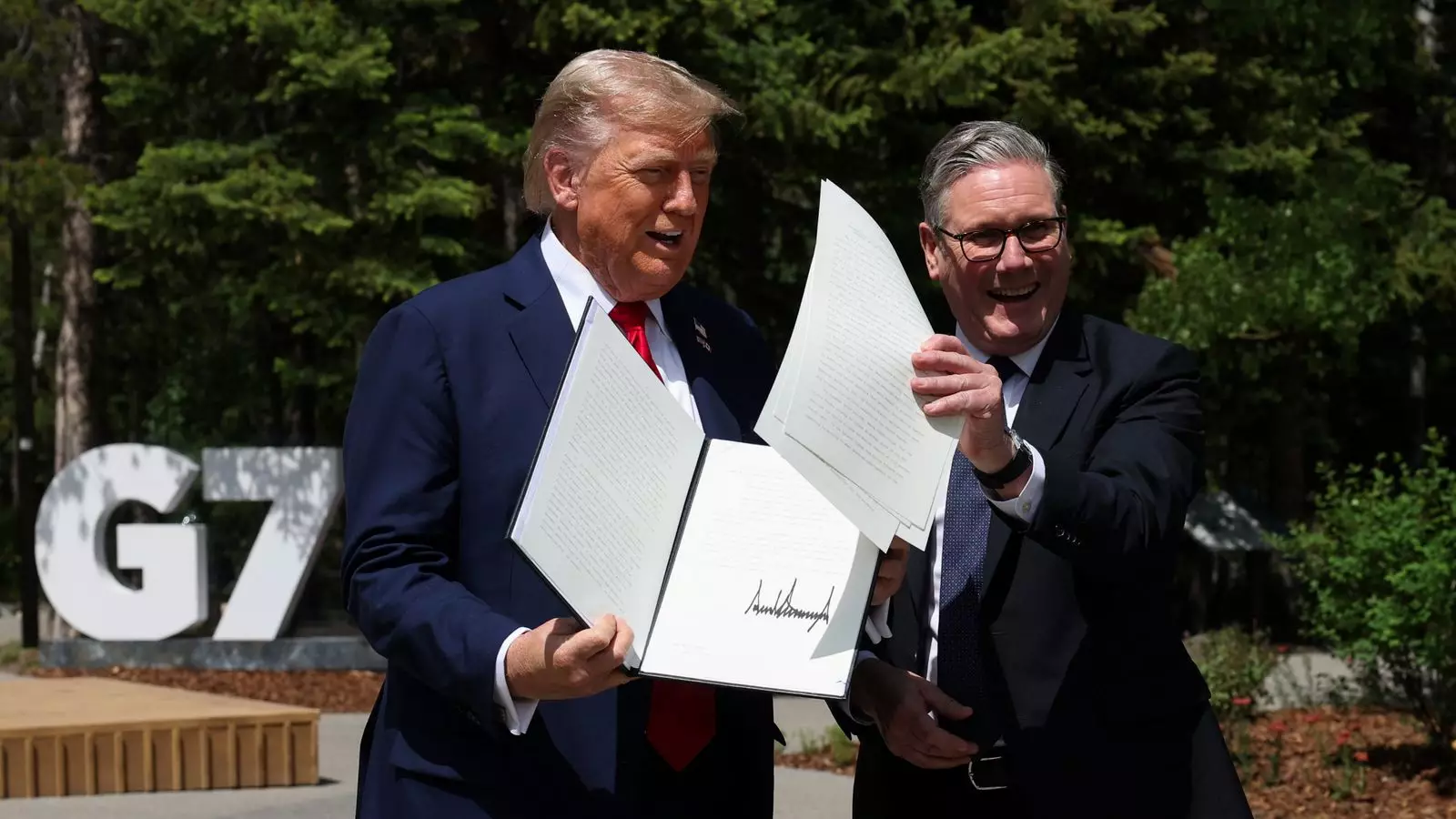Recent events at the G7 summit saw US President Donald Trump proudly declare the UK-US trade deal as “done.” The proclamation sounded triumphant, suggesting an era of economic synergies and cooperative spirit. However, we must peel back the layers of this façade to unveil the issues underpinning this seemingly laudatory agreement. The optimism projected by both leaders, including the praise heaped upon Labour leader Sir Keir Starmer, masks uncertainties that could prove detrimental for both nations. The nature of political agreements often thrives on rhetoric, where reality can lag painfully behind promises.
Trump’s comment that the deal “will produce a lot of jobs, a lot of income” should be scrutinized with skepticism. “Jobs” and “income” have become keywords in political discourse, often wielded without substantial evidence or foresight. The recent global economic disruptions due to the pandemic have magnified the fragility of job markets and the volatility of income sources. Are we indeed creating a sustainable economic future, or are these merely echoes of political desire tailored for the media? An abundance of hope does not equate to tangible outcomes, and blindly accepting such proclamations serves only to placate public concern without addressing underlying issues.
Tariffs: The Geography of Protectionism
Tariffs represent a critical aspect of international trade agreements, and the ambiguity surrounding them in this deal is nothing short of troubling. Although Trump assured that the UK is “very well protected” against future tariffs, the lack of clarity regarding the specific rates—most notably for British steel—hints at problems lurking just beneath the surface. Why is there an apparent hesitance to commit to concrete numbers? In an era where trade wars escalate unpredictably, the reliance on vague assurances from unpredictable leaders should raise red flags along the UK’s industrial corridors.
The government’s response to potential tariff rates reflects a troubling penchant for glamorizing negotiable outcomes. The concern that one country may engage in protectionist practices at the expense of another raises questions about the efficacy of this ‘partnership.’ If the UK is to thrive in a post-Brexit world, it cannot afford to be made a pawn in a larger geopolitical chess game. The relationship appears balanced precariously on the knife-edge of personal rapport between leaders like Trump and Starmer rather than on firm economic principles—an unsettling realization amid a tumultuous global economy.
A Show of Strength, or a Misguided Obsession with Charm?
The relationship between Trump and Starmer, described as friends and allies, is a curious amalgamation of mutual admiration and political expediency. While it may be tempting to celebrate the chemistry and camaraderie between the two leaders, the reliance on personal rapport hints at an alarming trend in political governance. Personal affection should not overshadow the pressing need for transparency, accountability, and policy consistency.
The farcical scene where Trump hoisted the agreement into the air, while papers spilled from its binding—accentuated by Starmer’s swift attempt to gather them—perfectly encapsulates the fragile nature of political achievements. It begs the question: are we left to pick up the pieces of an agreement that may falter under the weight of real-world challenges? Such imagery sends a message—not of strength, but of disarray, illustrating that our political leaders may be more interested in spectacle than in securing firm foundations for future prosperity.
The Illusion of Unity: A Cautionary Tale
The overarching theme of the summit demonstrated a desire for unity yet was simultaneously marred by the actualities of political constructs that often fail to realize their ambitions. The leaders’ banter about liberal versus conservative viewpoints gives the impression of a harmonious strategy but thinly veils the fundamental ideological divides that remain within both societies.
The UK-US trade deal is not merely a bilateral arrangement; it is a microcosm of a broader struggle within our globalized society, pitting individual nations against each other in a bid for economic survival. While it is essential to celebrate diplomatic engagements, it is equally important to question their substance. In the clamor for celebratory rhetoric, we must not lose sight of the realities that underpin our political landscape. Without the critical scrutiny of agreements heralded as “done,” we risk resigning ourselves to an uncertain future, held hostage by the bravado of leaders who may not have the best interests of their citizens at heart.


Leave a Reply